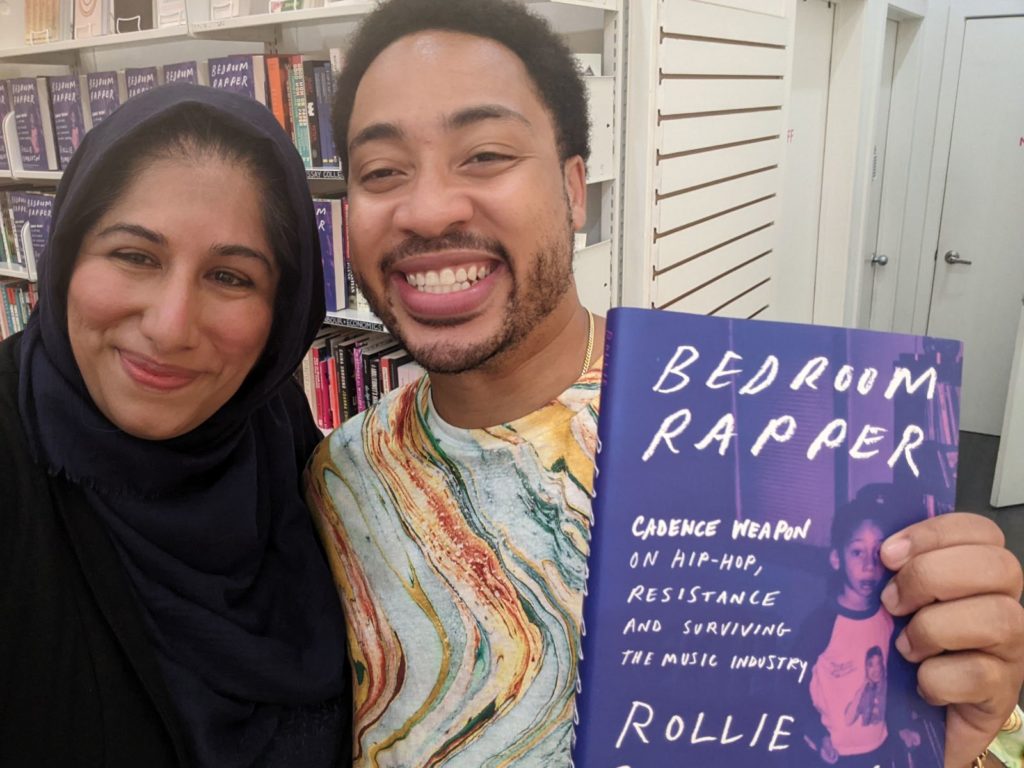
Ausma Malik is Atkinson’s Director of Advocacy and Organizing.
“Musicians are the original gig workers. Same as Uber drivers and food delivery workers. I realized we’re in the same fight.”
Rollie Pemberton (aka Cadence Weapon) said this in response to a question about artists as workers at a public reading of his new book, Bedroom Rapper. He had a lot more to say about the differences between music scenes across Canada (we’ve got good ones!), the socioeconomic realities that shape them (like the cost of rent!), and the insight that came with deciding which stories he wanted to write and tell (and share in his new album!).
It was a full circle moment for me. Jennifer Hollett, former MuchMusic VJ and now Executive Director of The Walrus, introduced Rollie to my Atkinson co-workers and me when we were planning My Labour Our Future – a special gathering for 100 leading decent work advocates and activists to mark the 100th anniversary of the International Labour Organization in 2019.
Rollie was one of four featured storytellers at that event. He told a story about the music industry that he recounted more publicly in 2021 in his Substack newsletter. His song “Large” was on loop at this event. It became the unofficial anthem of the decent work movement, calling people to tap into their power to change their working conditions as the ultimate flex.
When COVID-19 hit, Rollie showed up to support a historically Black neighbourhood in Toronto called Little Jamaica. Residents and business owners were dealing with pandemic shutdowns and decades-long construction projects that threatened the neighbourhood’s very existence. The track “Skyline” on his 2021 Polaris Prize winning album, Parallel World, gives voice to some of the community’s concerns: “They don’t want civic engagement / LRT stations in Little Jamaica / Lead to mass displacement.”
The roots of the neighbourhood, the artists who put it on the map, the community that formed it, and the cycle of neglect and displacement experienced by Black communities. Rollie got more people talking about these subjects with his Hazlitt article and subsequent conversation with Myseum’s Josh Hayder. Listening to him lift up issues and the work of Black Urbanism Toronto and others, we were inspired to do more to strengthen the connections between culture workers and others who are in the same fight for decent work in an unfair economic system.
So a year ago, we decided to adapt our fellowship model to create something new – a unique opportunity for an Indigenous, Black or racialized artist who is rooted in their chosen community, has a powerful and hopeful public voice, and is demonstrating outstanding leadership on issues tied to our charitable objects. We knew the first recipient would help us understand the waves only culture workers can make within social movements and the corridors of legislative and corporate power. The shape and scope of the fellowship would emerge from our collaboration with them and their communities.
Asking Rollie to be our first Atkinson Artist was a logical next step. His “cadence is his weapon” in the same way that Joseph Atkinson’s “pen was mightier than a sword.” Together, we’re investing in “the solutions beyond our wildest imaginations that surface when workers and their allies create vehicles capable of challenging concentrated economic and political power, and shape the work of the future in ways that benefit us all” – a vision shared by workers rights activists Sarita Gupta and Erica Smiley in their new book, The Future We Need: Organizing for a Better Democracy in the Twenty-First Century.
On a part-time basis over the next three years, Rollie will write, speak, perform and initiate projects and events with other artists and activists who identify with movements for decent work and a fair economy. We expect to continue hearing his voice in public debates about city building, urban gentrification in neighbourhoods like Toronto’s Little Jamaica, and on unfair working conditions in the gig economy. We’re also looking forward to new music that reveals the hidden realities of income, wealth and democratic inequality.
As for me, I’m changing up where and how I fight for decent work and fair economies this summer and into the fall. I’m taking an unpaid leave of absence from my role at Atkinson to run for public office. I’m a candidate for Toronto City Councillor in the October election, campaigning to represent the people who live in Spadina-Fort York at City Hall.
I want to leave you with a playlist to energize all the moves we’re making right now in our organizing efforts. My co-worker Nora Cole and I were inspired by the hashtag #HotLaborSummer, originated by Chris Smalls who is a leader in organizing the first union of Amazon warehouse workers in the United States. Check it out and you’ll see how workers are taking on some of the biggest employers and winning this year. The time is right for a very Canadian adjustment to the hashtag to capture stories from North of the 49th: #HotLabourSummer. I hope you’ll share favourite summer jam about worker power and keep up the fight wherever you are.
